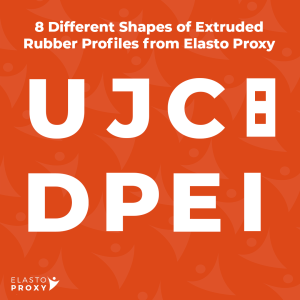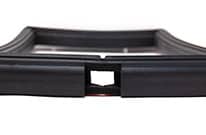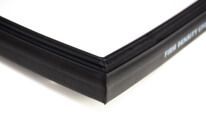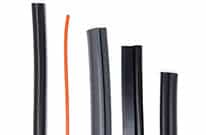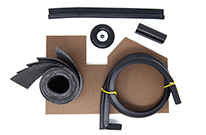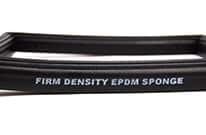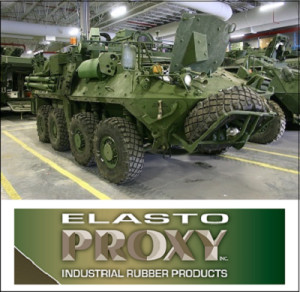 Learn about military specifications for rubber gaskets, and why defense contractors need a custom fabricator that can do more than convert elastomeric materials.
Learn about military specifications for rubber gaskets, and why defense contractors need a custom fabricator that can do more than convert elastomeric materials.
Military specifications for rubber gaskets are designed to ensure that elastomeric materials support the mission by meeting published performance requirements. Standards and specifications for the U.S. military are authorized by the Department of Defense (DOD), and used by defense contractors throughout North America. Tier 1 and Tier 2 suppliers are familiar with these standards, but may not fully understand how the details of a particular specification can affect purchasing and manufacturing decisions.
Official DOD definitions specify many different document types, but the format of each military standard generally begins with the letters “MIL”. For the defense supply chain, however, complying with what’s inside the standard is what matters. With rubber gaskets, buyers need to choose materials that meet or are tested to published requirements for properties such as hardness and oil-resistance. In addition, elastomeric gaskets for defense-related applications must be custom fabricated to exacting tolerances.
Let’s take a look at two military standards for rubber gaskets: MIL-R-900F and MIL-G-1149C. First, however, we’ll examine a related standard for non-metallic gasket materials.
MIL-G-12803C for Non-Metallic Gasket Materials
MIL-G-12803C isn’t about rubber gaskets, but it’s important to understand because of its relationship to elastomeric gasket materials. As the introduction to MIL-G-12803C clearly explains, this spec doesn’t cover molded rubber gaskets or rubber sheet gaskets. Rather, MIL-G-12803 describes non-metallic materials such as cork, cellulose, flexible graphite, and fluorocarbon polymers. In other words, just because a spec is about non-metallic gasket materials doesn’t meant it’s relevant to your technical design.
MIL-R-900F for 45-Durometer Rubber Gasket Materials
MIL-R-900F is a performance specification for 45-durometer rubber used in gaskets for airtight and watertight enclosures over a temperature range of -20° to 130° F (-28.9° to 54.4° C). Rubber materials that meet MIL-R-900F requirements are vulcanized, ozone resistant, and tested according to ASTM standards for accelerated cracking. This specification establishes not just initial physical properties such as tensile strength, but also material properties after various forms of aging and liquid immersion.
In addition, MIL-R-900F lists acceptable form factors such as rubber sheets, rectangular cross-sections, and shapes that are cut from rolls or sheets via fabrication methods such as waterjet cutting. This military specification covers both molded and extruded materials, and establishes testing requirements for rubber suppliers and manufacturing requirements for custom fabricators. These include thickness specifications for sheets, dimensional specs for cross-sections, and tolerances for joined or spliced seams.
MIL-G-1149C for Synthetic Rubber Gasket Materials with 50 and 65 Durometer
MIL-G-1149C is another military specification for gasket rubber, but one that covers vulcanized synthetic elastomers with a nominal hardness of 50 or 65 durometer. Like MIL-R-900F, the MIL-G-1149C standard defines physical properties along with aging and fluid-immersion requirements. Allowable form factors include sheets, cross-sections, and shapes cut from sheets, molded rubber, and extruded rubber. Examples of these materials include nitrile, silicone, and EPDM sheets or profiles.
MIL-G-1149C also defines two “Types” of rubber. Type I materials have a nominal hardness of 50-duro. Type II materials have a nominal hardness of 65-duro. Within each type, there are multiple classes. For example, Class 1 rubber resists oil; Class 2 rubber does not. Class 5 gasket rubber is fuel-resistant, a potentially important consideration in military vehicles. Defense industry buyers should also consider that MIL-G-1149C permits not only new materials, but recovered rubber that’s been reprocessed.
Gasket Fabrication for the Defense Supply Chain
Do you need sealing solutions for military projects and programs? Do you have questions about military standards for elastomeric gaskets, or about the physical properties of rubber? For over 25 years, Elasto Proxy has strengthened the defense supply chain through custom gasket fabrication. For low-to-medium volume quantities, including replacement parts and spares, we’re ready to assist you. So whether you need one-off seals or taped gaskets that arrive ready-to-install, we have your sealing solution.
Please contact us for more information, and enjoy this short video about the article.


